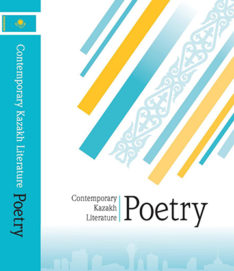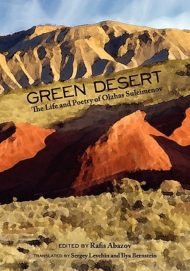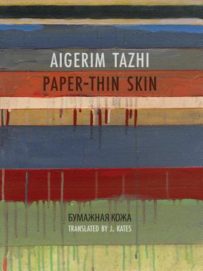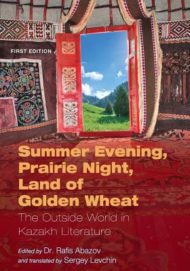
by Timothy Walsh
If asked about Central Asian poets, most Americans would draw a blank. Even poets and professors might struggle to name one—which is odd, since over the last two centuries Central Asian poets have been hugely influential in the English-speaking world, particularly in America. It’s just that we don’t think of these poets as Central Asian, even though they are.
Omar Khayyam was born in Khorasan in 1048 and spent many of his most productive years in major Central Asian cities—Samarkand, Bukhara, Merv, and Balkh—all of which were thriving cultural and intellectual centers. Khayyam was a celebrated mathematician, philosopher, and astronomer. He was also a poet. When Edward FitzGerald published his Rubaiyat of Omar Khayyam in 1859, it set loose a flood of enraptured admiration that reverberated through all levels of society for the next century. FitzGerald’s rather freely translated quatrains about “a Jug of Wine, a Loaf of Bread—and Thou” captured the imagination of the English-speaking world, from 19th-century London aesthetes to Depression-era schoolboys in Brooklyn—not to mention writers as diverse as Mark Twain, Ezra Pound, Woody Guthrie and Jack Kerouac.
Then there’s Jallaludin Rumi. As with Omar Khayyam, people in the West tend to think of Rumi as vaguely “Eastern” or as a Sufi mystic from Persia or even from Anatolia, where his later years were spent. But Rumi was Central Asian through and through. Born either in Vakhsh (in what is now Tajikistan) or Balkh—(this is the subject of heated arguments)—Rumi spent his formative years in Samarkand. His peripatetic journeys westward were due to his fleeing the invading armies of Genghis Khan.
In recent years, Rumi’s poetry in translation has permeated the West, a touchstone to New Age philosophy and spirituality. His timeless wisdom has leavened our modern sensibility and influenced writers and artists from Robert Bly to Coldplay, from Madonna to Mary Oliver.
Many other things we cherish in the West also have unsuspected Central Asian origins: the pants you wear (invented by Central Asian steppe nomads for horse riding), the apples you eat (all genetically descended from the wild apple forests in southeastern Kazakhstan). Garlic and marijuana both originally hail from Central Asia. How about Appalachian fiddle music or Mozart string quartets? Yes, the invention of stringed instruments played with a bow likewise hails from the horse-riding nomadic cultures of the Central Asian steppe (which also explains why a violinist’s or cellist’s bow is strung with horsehair).
When thinking of Central Asia today, we inevitably think in terms of the national boundaries of five countries (Kazakhstan, Uzbekistan, Kyrgystan, Tajikistan, and Turkmenistan), but these borders are only a hundred years old, imposed by the Soviet Union with many jagged, inscrutable contours purposely designed to isolate certain ethnic groups from their ancestral homelands. Culturally and geographically, however, Central Asia really is a distinct region, despite the arbitrary modern national borders. Culturally, it encompasses the Turkic nomadic groups of the north, where conditions are such that only nomadic or transhumant societies could survive, and Persianate groups to the South.
Geographically, the region is defined by the northern taiga forest, the vast central steppe, and immense deserts to the south and west. Mountain ranges define the effective, often impenetrable natural barriers—the Pamirs and Hindu Kush to the south, the Tien Shan and Altai to the east, the Caucasus (and the Caspian Sea) to the west.
For thousands of years, the unique culture of Central Asia was formed by the symbiosis and sporadic bloody conflicts between the horse-riding nomadic cultures of the immense Central Asian steppe and the settled urban cultures of the great cities to the south. Over the centuries, this synergy and conflict came together to produce one of the most dynamic and creative epochs in world history (brilliantly recounted in S. Frederick Starr’s Lost Enlightenment: Central Asia’s Golden Age from the Arab Conquest to Tamerlane). This Central Asian Golden Age gave us algebra, the foundations of modern medicine (in the writings of Avicenna), and an unprecedented literary and poetic flowering.
All this I mention as a prelude to considering contemporary Kazakh poetry in English translation. Kazakh poetry is not something new on the world stage. Even though it has not gotten the recognition it deserves in the West, it is a poetry and culture with deep roots that predates the founding of the United States by a millennium or so.
Kazakh poetry and its literary traditions are still indelibly permeated with a nomadic mindset and worldview. While Omar Khayyam and Rumi were also Central Asian poets, they were poets of the city, brought up and educated in the rich urban culture of the great Silk Road metropolises, with their revered madrassas and libraries. Kazakh poetry, on the other hand, was almost entirely oral poetry—either improvised on the spot or memorized historical epics and folktales (the great Kyrgyz epic, Manas, at 500,000 lines, is twenty times longer than The Iliad and The Odyssey combined, but is still memorized by legions of Manaschi).
Due to the many upheavals of the twentieth century and the Soviet regime, contemporary Kazakh poetry is now much more complex and varied. While celebrating and retaining the traditions of its nomadic past, it has also incorporated elements of modern urban realities as well as techniques and perspectives colored by interactions with other cultures.
 Ten years ago, there was virtually no contemporary Kazakh poetry in English translation available in book form, but a flurry of new publications has thankfully remedied that situation. The recently released Contemporary Kazakh Literature: Poetry contains a veritable treasure trove of modern Kazakh poetry—thirty-one of Kazakhstan’s preeminent poets translated by a team of five translators. (The anthology is published by Cambridge University Press in partnership with the National Bureau of Translations and is available as a free download.)
Ten years ago, there was virtually no contemporary Kazakh poetry in English translation available in book form, but a flurry of new publications has thankfully remedied that situation. The recently released Contemporary Kazakh Literature: Poetry contains a veritable treasure trove of modern Kazakh poetry—thirty-one of Kazakhstan’s preeminent poets translated by a team of five translators. (The anthology is published by Cambridge University Press in partnership with the National Bureau of Translations and is available as a free download.)
What is probably most appealing about Kazakh poetry is its close relationship to the natural world—not so much as observation, but as lived experience. You feel as if you are in the saddle as you are reading, the aromatic wormwood and feathergrass of the steppe brushing against your boots. As Fariza Ongarsynova writes in “Patterns of Grass and Flowers Ran Down onto the Carpets,” “We were born in the saddle and live on the road.”
In these poems, totemic animals like the wolf and the eagle recur constantly as fellow creatures, not as lesser beings, with the horse remaining central to all human endeavors, including the arts. Shomishbay Sariyev speaks for many Kazakh poets when he writes, “Embarking on this poem, / it’s like I’m saddling a horse.”
A living sense of Kazakh history and traditions imbues many of these poems, whether Bakhytzhan Kanapyanov’s evocative “Along the Mountain River on Horseback,” or Yessengali Raushanov’s starkly tragic “1932. Kazakhstan Famine Year,” or Olzhas Suleimenov’s incendiary “Asian Bonfires.”
A wealth of strong women’s voices runs through the anthology, from the heartfelt pastoral lyrics of Marfuga Aitkhozha and Fariza Ongarsynova, both born in the 1930s, to the startlingly fresh and modern musings of Gulnar Salykbay in poems like “The Sky Can Capsize Out of the Blue” or “Waiting for You Is Like Adding Pepper to Honey.”
With all these poets—consistent with their Kazakh nomadic heritage—the interrelationship with the natural world is key. As Akushtap Bakhtygereyeva writes in “Tell the Zajyk River”:
Tell the Zajyk River, there is a girl,
who is willful and free like him,
writing her poems on his
white sails like a wave’s foam.
A strong environmental consciousness characterizes many Kazakh poets, reaching its pinnacle in the work of Kulash Akhmetova, whose distinctive voice manages to fuse a lyrical sensibility with an apocalyptic awareness. This is perhaps most perfectly conveyed in “Prosperity,” where Akhmetova pleads, “Forgive us our stupid epochs, /drunk with war and apocalypse.” The poem begins with an evocation of the natural world as paradise, but quickly pivots to an indictment of humanity’s transgressions:
No one is innocent among the
passing multitudes—as, age upon
age, we reduce the world to ashes.
Akhmetova sums up the heightening global dilemma with lines as succinct as a knife’s edge:
No, it is us who are defenseless,
as much as these poor animals.
Human and animal now one—
the bullet is heading our way too.
In Akhmetova’s “Prayer,” a Whitmanesque long line is fused with an apocalyptic vision reminiscent of Blake. Again, she begins with an evocation of unsullied paradise:
I saw mountains—granite peaks in a diamond crown.
I saw the sky—radiant spheres in the endless cosmos.I saw a cornfield—glowing rays of a paradise morning.
I saw groves—pouring forth their rich aromatic leaves.
This quickly shifts to a dark vision of the present:
I saw the air—filled to the brim with poisonous winds,
flowers and trees, and the birds of the east have died forever.
In another poem, Akhmetova questions the madness of humanity’s endless and damaging building spree on our “multi-storied planet Earth,” observing that “a person’s anxiety leads him to build cities” (echoing the nomad’s perennial distrust of “permanent” structures).
Like Akhmetova, Svetqali Nurjan is painfully aware of our dire global predicament, often turning to Kazakh history and tradition for wisdom. Nurjan’s arresting metaphors and startling verbal dexterity spill from the page, as in “Steppe. Night. Magic. World View”:
Having painted every sound with the thickest paint,
night and magic fell into each other’s arms,
The sky-cat licked cloud-cream
from the milky surface with its moon-tongue.
Shooting stars sound like a broken string,
or like salt being sprinkled over liver.
Nurjan, who is from the Mangystau region in western Kazakhstan, worked as a machine operator and as a horseman before turning to poetry, and he makes use of his experiences in poems like “Azure World. Longing for Spring,” which describes an idyllic journey on horseback into the hills, or the fascinating “Sergei Yesenin in the State of Drunkards,” which manages to encapsulate centuries of Russian and Central Asian literary relations in compelling, streetwise homage.
There are many other riches in this anthology, from Kadyr Myrza Ali’s cogent lament “The Earth” to Nazira Berdaly’s “The Red Dress,” which begins flirtatiously but ends with a metaphysical twist. Most of these poems and poets have been translated into English for the first time, making this an indispensable resource.
However, not all the poets are likely to resonate with American readers. Some are given to overt didacticism or nationalistic messages; others are marked by plain statement that does not translate well, producing such flat proclamations as, “There’s only one flag for us and one flag only, / Why were we born as men if not to defend it?” or “Looking up at the sky, / I am hoisting a blue flag/ to demonstrate my Turkic origin.”
Prosaic statements like these pale in comparison to the originality of poems like Svetqali Nurjan’s “In Search of Five Weapons,” where Nurjan manages to celebrate and lament all of Kazakh history in a few breathtaking pages.
For this reason, I would not recommend traversing this lengthy anthology from start to finish. Instead, here is my recommendation of twelve remarkable Kazakh poets to start with in this groundbreaking anthology (page numbers refer to the downloadable anthology):
1. Fariza Ongarsynova, page 75
2. Bakhytzhan Kanapyanov, Page 313
3. Kulash Akhmetova, Page 193
4. Svetqali Nurjan, page 425
5. Akushtap Bakhtygereyeva, Page 131
6. Gulnar Salykbay, Page 453
7. Yessengali Raushanov, page 403
8. Ulugbek Yesdaulet, page 385
9. Nazira Berdaly, Page 547
10. Marfuga Aitkhozha, page 55
11. Maraltai Raiymbekuly, page 471
12. Olzhas Suleimenov, page 35
 The Cambridge anthology contains a reasonably good selection from the work of Olzhas Suleimenov, the most famous and celebrated poet and statesman in Kazakhstan today. A much more comprehensive selection is contained, however, in Green Desert: The Life and Poetry of Olzhas Suleimenov (Cognella Academic Publishing, $73.95), which includes a generous sampling of Suleimenov’s early poetry, including “Earth, Hail Man!” which made Suleimenov a household word throughout the Soviet sphere. It also includes selections from the later poetry and an abridged version of the enigmatic and fascinating The Book of Clay.
The Cambridge anthology contains a reasonably good selection from the work of Olzhas Suleimenov, the most famous and celebrated poet and statesman in Kazakhstan today. A much more comprehensive selection is contained, however, in Green Desert: The Life and Poetry of Olzhas Suleimenov (Cognella Academic Publishing, $73.95), which includes a generous sampling of Suleimenov’s early poetry, including “Earth, Hail Man!” which made Suleimenov a household word throughout the Soviet sphere. It also includes selections from the later poetry and an abridged version of the enigmatic and fascinating The Book of Clay.
Coming of age in the 1960s, Suleimenov was very much in tune with the spirit of rebellion fermenting around the globe, whether in the guise of the Beatles, Martin Luther King Jr., or the May ’68 Paris uprising. His pioneering ethnolinguistic work, Az-i-Ya (1972), branded him as a dissident in the eyes of the Soviet authorities. Suleimenov was also the founder of the Nevada-Semipalatinsk antinuclear movement, which eventually shut down the Soviet nuclear testing program in Kazakhstan.
Through it all, Suleimenov wrote poetry that celebrated the Kazakh nomadic past while also incorporating an inclusive, global perspective. In both his poetry and politics, Suleimenov was never one to mince words, often leading him into hot water with the Soviet authorities while simultaneously making him into something of a folk hero for the Kazakh people, particularly as the Soviet Union crumbled.
Though Suleimenov is well traveled and cosmopolitan, his poetry is thoroughly infused with the steppe, Kazakh traditions, and genuine nomadic ethos—this probably accounts for his broad appeal, both within Kazakhstan and around the world. In poems like “The Lone Mustang” or “The Warrior Makhembet Prays Before Execution” or “Argamak” or the thrilling “Red Rider, Black Rider,” Suleimenov revivifies Kazakh history and tradition, radically departing from the received Soviet/Russophile perspective.
“Our history is a handful of flashes in the night of the steppe,” Suleimenov writes, but he constantly connects the currents and happenings of Central Asia to larger global concerns, as in one of Suleimenov’s best-known poems, “The Bonfires of Asia.” Here, Suleimenov evokes ancient shamans who gave humanity the gift of fire, of song and dance, of agriculture and horsemanship, suggesting how this Asian source radiated through the Western world:
The shamans
pressed light from blindness,
Beethovens from your deafness,
smelted Homer from your darkness,
and did not know their fate.
They crushed the ore,
extracted Talmuds and Qurans
by the carat.
Suleimenov is a wide-ranging poet of many moods, registers, and styles. His poems include evocative autobiographical scenes and remembrances, like the poignant “Childhood, Orchards, Ardor,” or the haunting “Native Soil.” There are also gentle love lyrics like “These Words Are Born of the Night,” where he addresses his lover beside him on the pillow:
By day the beating heart is dull.
Peace.
Quiet.
Snowdrifts weave their rich tapestries
upon the branches’ loom.
Snowdust drops softly
upon our destinies
like roaring time.
Green Desert is capably edited by Rafis Abazov, who provides a useful introduction (though it hardly merits the subtitle, The Life and Poetry of Olzhas Suleimenov, which erroneously suggests far more in the way of biography). The translations by Sergey Levchin and Ilya Bernstein are adroitly done, conveying nuances of meaning while preserving Suleimenov’s sometimes staccato, sometimes lyrical style. This is currently the only book-length translation of Suleimenov’s poetry readily available in English, so it fills what would otherwise be a gaping void. (Teas Press in Baku, Azerbaijan, has published several of Suleimenov’s works in English translation, but these are not easily obtainable.)
The poems of Aigerim Tazhi are as different as can be from Suleimenov; indeed, in terms of style and poetics Tazhi is unlike any of the Kazakh poets in the Cambridge anthology. Tazhi’s poems have been widely praised as a fresh new voice and for blazing a new direction among the youngest generation of Kazakh poets (and so it is something of a puzzle why she is not included in the Cambridge anthology).
 Thankfully, Zephyr Press has just published Tazhi’s Paper-Thin Skin (Zephyr Press, $15) in a vividly faithful translation by J. Kates. This is a bilingual edition, with the Russian original on the facing page, and includes a perceptive introduction by Kates. Tazhi’s distinctive voice and approach are immediately apparent:
Thankfully, Zephyr Press has just published Tazhi’s Paper-Thin Skin (Zephyr Press, $15) in a vividly faithful translation by J. Kates. This is a bilingual edition, with the Russian original on the facing page, and includes a perceptive introduction by Kates. Tazhi’s distinctive voice and approach are immediately apparent:
Rain ran over a keyboard of leaves.
A freshwater sea overflowed galoshes.
Clumps of earth grew into hooves.
Heads crowned with rainbow-haloes.
We groan tenderly with watersoaked songs.
We fish in puddles with question-hooks.
Though some of Tazhi’s images are recognizably Central Asian, her style and sensibility are radically different. Her poems live in the actual moment of perception, plumbing the depths of immediate sensation, rather than attempting to make things narratively cohere or resonate with historical significance:
A runner with a flashlight on his head
grabs frames from the darkness.
The sinking land, a wide-eyed beast.
A glade trampled, a glint of water.
Shrubbery, lumps of bovine bodies.
A graveyard, an oak at the edge of a village.
Acorn caps clinging to branches—
little empty bells.
Tazhi’s poems are strikingly imagistic, her syntax shorn of unnecessary appendages. By steering clear of any narrative thread or conceptual utterance, they seem like pure instants of perception. Gone are all references to “Kazakhness,” to Kazakh history or tradition, or to the role of the poet in society (which are ubiquitous in other modern Kazakh poetry).
Tazhi seems closer to H.D. or William Carlos Williams than any of her Kazakh contemporaries in the Cambridge anthology. As Tazhi herself explains in an interview, “In general, poems are ciphers an attentive reader picks up keys to, codes penetrating deeper and deeper into what is essential, gradually revealing each new layer of meanings.” This vision of poetry would also be true of an ecstatic poet like Rumi or a Symbollist poet like Mallarmé—but it is not true of most twentieth-century Kazakh poetry, where discursive and narrative elements prevail.
In Tazhi’s seeringly lucid poems, the reader is made to look at the world around them afresh—a world where artificial borders and nation-states have little relevance. In the poem that gives the collection its title, Tazhi seemingly addresses the reader (and/or herself):
Your name? Say the word out loud.
A furrowed face. The angle of the sun shifts.
Paper-thin skin translucent,
letters shine through the forehead.
Like the lightning-flash of Emily Dickinson’s brief, gnomic utterances, Tazhi’s poems are exhilarating in themselves, but are also a necessary corrective to any monolithic view of contemporary Kazakh poetics.
If this review motivates you to look into the riches of Kazakh poetry (as I hope it does), you might also be curious about early modern Kazakh poetry. In Kazakhstan, if you were to ask a stranger on a bus if they could recite a poem by Abai, they almost surely could. If you asked teenagers or grade schoolers, they’d also most likely happily comply with a song or a poem by Abai.
 Abai Kunanbayev is universally revered as the founder of modern Kazakh literature, while other early modern poets like Zhambyl or Saken Seyfullin remain close to the hearts of the people. Currently, the only available anthology that includes a generous sampling of these early modern Kazakh poets is Summer Evening, Prairie Night, Land of Golden Wheat (Cognella Academic Publishing, $72.95), published by Cognella in 2016. Here, you will also find a wealth of lesser-known poets like the wonderful Miriam Khakimzhanova or the magisterial Magzhan Zhumabayev.
Abai Kunanbayev is universally revered as the founder of modern Kazakh literature, while other early modern poets like Zhambyl or Saken Seyfullin remain close to the hearts of the people. Currently, the only available anthology that includes a generous sampling of these early modern Kazakh poets is Summer Evening, Prairie Night, Land of Golden Wheat (Cognella Academic Publishing, $72.95), published by Cognella in 2016. Here, you will also find a wealth of lesser-known poets like the wonderful Miriam Khakimzhanova or the magisterial Magzhan Zhumabayev.
The beauty and freshness of their verses hits you like a breath of rare mountain air.
So why read modern Kazakh poetry when you no doubt have a backlog of other writers and poets calling for your attention? In closing, I’ll let Olzhas Suleimenov have the last word. As he writes in his Foreword to Green Desert:
I would like for American readers, by going through the lines of the poems by a Kazakh author, to learn a little more about the unknown before them and facets of their own spiritual life. Because we always
. . . roam toward ourselves
by recognizing ourselves in the other.
